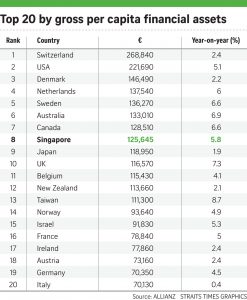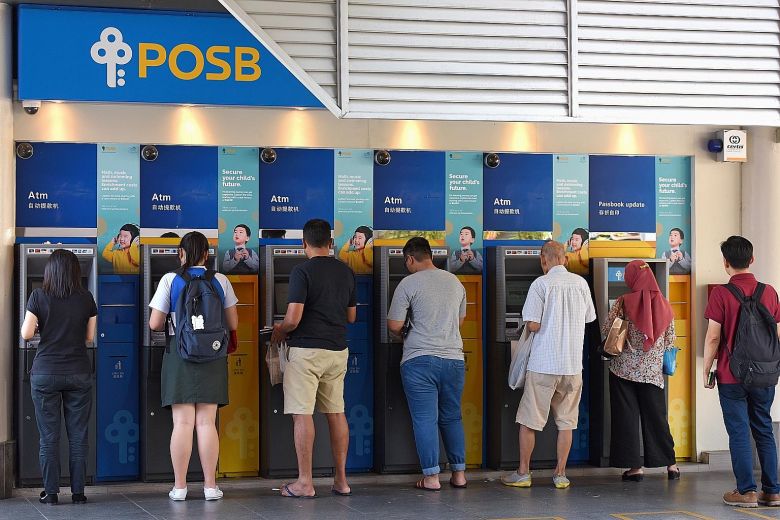Singapore is No. 1 in Asia for gross financial assets
Singaporeans have net financial assets of about €89,570 (S$143,000) on average, putting the country at seventh among the top 10 richest nations, according to a new report yesterday.
It found that the net financial assets of households here rose 9.6 per cent last year – “the fastest rate in the last four years”.
Net financial assets are those such as bank deposits and insurance minus liabilities like loans.
Singapore was third in Asia in net terms, but took the top spot in gross terms or before debt, beating Japan and Taiwan, said the Allianz Global Wealth Report, which analysed 53 territories.
The United States topped the table with net financial assets per capita of €177,210 and Switzerland was next with €175,720 2.
Japan was third with €96,890, Taiwan at No. 5 with €92,360, and together with Singapore, are the only Asian names in the top 10.
Gross financial assets – the sum of assets such as bank deposits, securities and insurance assets – per capita here was around €125,645 as at Dec 31 last year.

ON THE RIGHT PATH
Households in Singapore have accumulated quite a lot of pension assets … (reflecting) the design of the Singaporean pension system with its strong second pillar of funded obligations. However, given the rather sharp rise in the old age dependency ratio, this is the right thing to do.
ALLIANZ CHIEF ECONOMIST MICHAEL HEISE
The report said Singapore’s solid performance could be due to reasons such as debt growth remaining in the doldrums last year, so debt ratios continued to decline. However, it noted that debt ratios – total liabilities as a percentage of total assets – are still relatively high at 73.7 per cent.
Singapore’s per capita liabilities was €36,075 at the end of last year, among the highest in Asia. “On the other hand, asset growth accelerated considerably in 2016, reaching 7.4 per cent, mainly due to high growth of insurance and pensions assets, whose share in the asset portfolio of Singaporean households is higher than in all other Asian countries at 46.3 per cent,” said Allianz.
Allianz chief economist Michael Heise said in a statement: “Households in Singapore have accumulated quite a lot of pension assets… (reflecting) the design of the Singaporean pension system with its strong second pillar of funded obligations.
“However, given the rather sharp rise in the old age dependency ratio, this is the right thing to do.”
Bank deposits remained the most popular asset class among private households in Asia last year, representing 45.3 per cent of total gross financial assets.
For Singapore, insurance and pensions was the largest asset class at 46 per cent while bank deposits made up 37 per cent.
The report said: “Private households in Singapore, South Korea and Taiwan particularly favoured life insurance policies and pension funds.”
It added that the performance of the leading indices in individual territories explains such investor behaviour. For instance, the gains that investors have made on shares in Taiwan and Singapore have been “rather modest from a long-term perspective”.
Allianz said: “If you had invested €100 in the Taiwan Taiex at the end of 1999, you would have had €109 in your account at the end of 2016, an annual return of 0.5 per cent, while if you had invested in the Straits Times (Index), you would have had €114. That represents an annual return of 0.8 per cent.”
It also noted the old age dependency ratio is expected to rise much more sharply in countries like Singapore and South Korea than China.
“Singapore and Malaysia have a strong second pillar, which explains the high proportion of receivables from life insurance companies and pension funds in the portfolios of private households,” it added.
Source: http://www.straitstimes.com/business/companies-markets/spore-is-no-1-in-asia-for-gross-financial-assets


 Thailand
Thailand




